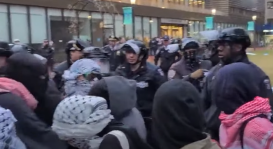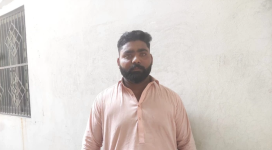A new measure, entitled, “Safe Harbor for Churches,” intended as a protection for the free-speech rights of churches, received criticism from both the evangelical and ecumenical wings of Christianity, which called it a “dangerous” proposition and a “slippery slope” to tread on for churches.
The “Safe Harbor” measure, added to a tax reform bill, H.R. 4520, allows pastors and religious leaders to “unintentionally” engage in political campaigns as private citizens up to three times each year before their organization’s tax-exempt status is revoked.
In a letter written to the Speaker of the House Dennis Hastert on June 9, Richard Land of the Southern Baptist Convention – arguably one of the most evangelical denominations in the States – called the measure “dangerous” and “woefully inadequate.”
The result of the legislation would not be a safe harbor but “an unacceptable intrusion of the IRS into the business of a church,” Land, president of the Ethics and Religious Liberty Commission of the SBC wrote.
Land clarified that since pastors and other religious leaders could already comment on political issues as private citizens, the part of the provision that allows pastors to privately speak is “meaningless.”
“But what is worse, the paragraph actually prohibits a religious leader from expressing his personal opinion about a political campaign at ‘an official function’ of his church. Who will determine what serves as an ‘official function?” asked Land.
According to Land, the main reason the SBC stands against the provision is that the measure would make churches more vulnerable to the scrutiny of the IRS and the government.
The ERLC opposes “the intrusion by the IRS into the church’s life and business that would be required to determine whether or not an infraction was intended,” Land said in the letter. “Intent is a difficult thing to prove, and we can imagine a church incurring considerable expense in time and energy attempting to defend itself against an IRS determination.”
The measure’s provision for penalties against churches based on their “political activities” instead of their “political expenditures” is unacceptable as well, Land wrote, noting, “This change exposes churches to a much broader scrutiny and liability,” he said.
The language also fails to restore free-speech rights “stolen from churches” when Congress adopted in 1954 a measure to bar tax-exempt organizations such as churches from participation or intervention on behalf of any candidate in an election campaign, Land told Hastert. That 50-year-old law has had a “chilling effect” on churches and preachers, he continued.
“Today, many congregations and church leaders have been completely silenced because of their fear” their tax exemption would be annulled, Land said.
“While we would counsel churches not to endorse candidates, and to exercise great caution in engaging in campaign speech and activity if their historic free-speech rights were restored,” Land said, “we believe that it is the churches, not the government, that should decide these issues.”
Meanwhile, the National Council of Churches also relased a statement criticizing the measure, but for different reasons.
In a June 10 news release, the National Council of Churches’ General Secretary Bob Edgar said the bill would “raise moral questions about the actions of religious leaders and their congregations and disrupt the political process itself.”
In the same news release, the NCC noted a statement from a member of the Interfaith Alliance, who feared the measure would change the nation’s tradition of separation of church and state because of the favor it gives to Christian churches.
"The bill encourages willful ignorance of the law by houses of worship, amending the tax code to permit churches, and only churches, to engage in political campaigns while maintaining their status as tax-exempt organizations,” Welton Gaddy of the IA was noted as saying.
The House Ways and Means Committee will most likely be voting on the Safe Harbor for Churches Provision on Monday, June 14. The NCC urged “concerned citizens” to call their members of congress to remove the proposed provision. The NCC also disapproved of a similar bill entitled, “The House of Worship Free Speech Restoration Act,” which calls for the protection of the freedom of speech by pastors and churches.
Land of the ELRC, however, applauded the House of Worship Act, calling it something that is necessary to protect churches and religious bodies.
The Worship Act would effectively prevent a church’s tax-exempt status from being affected by the “content, preparation or presentation of any homily, sermon, teaching, dialectic or other presentation made during religious services or gatherings.”
In addition to the ERLC, other supporters of Jones’ bill are the American Center for Law and Justice, Family Research Council, Focus on the Family, National Right to Life Committee, Priests for Life and Americans for Tax Reform.







